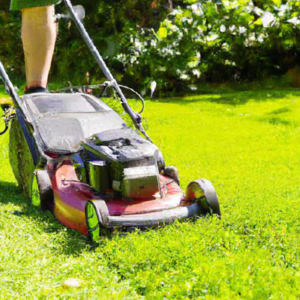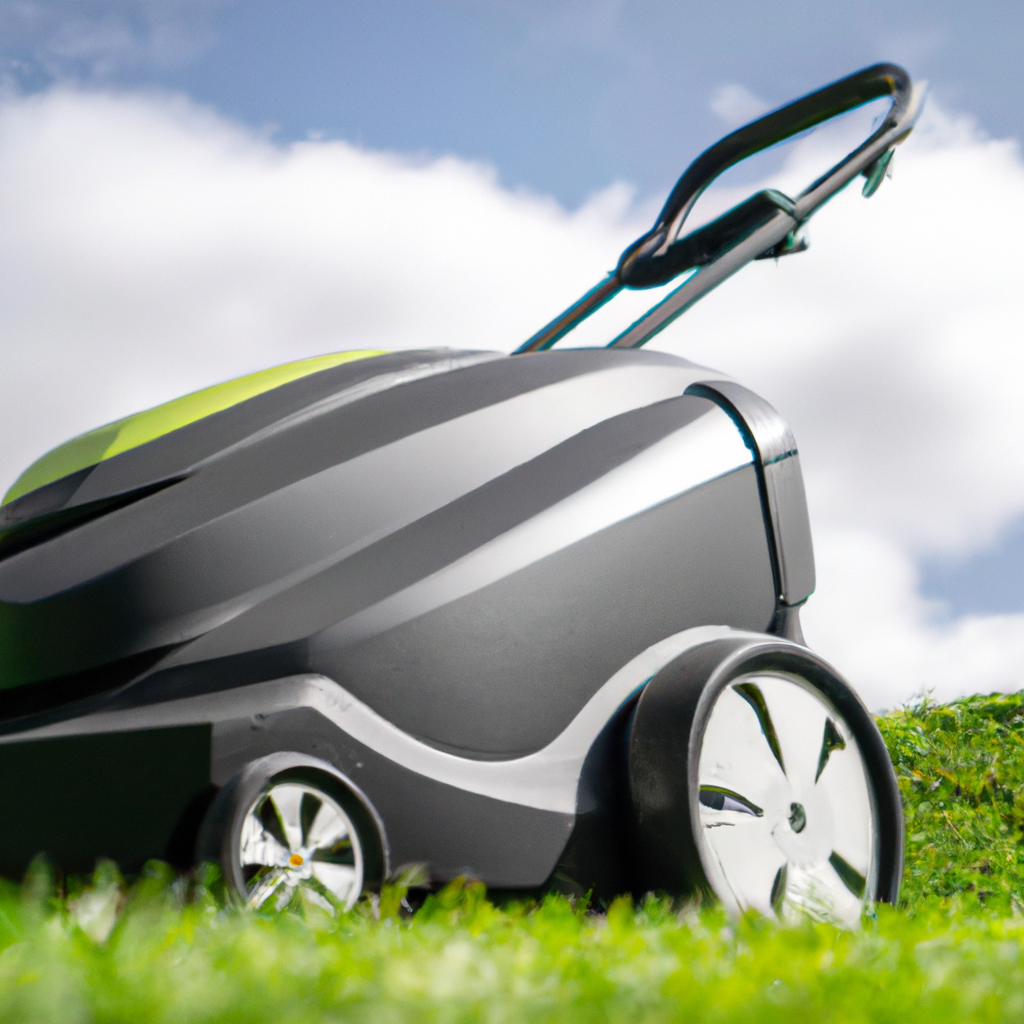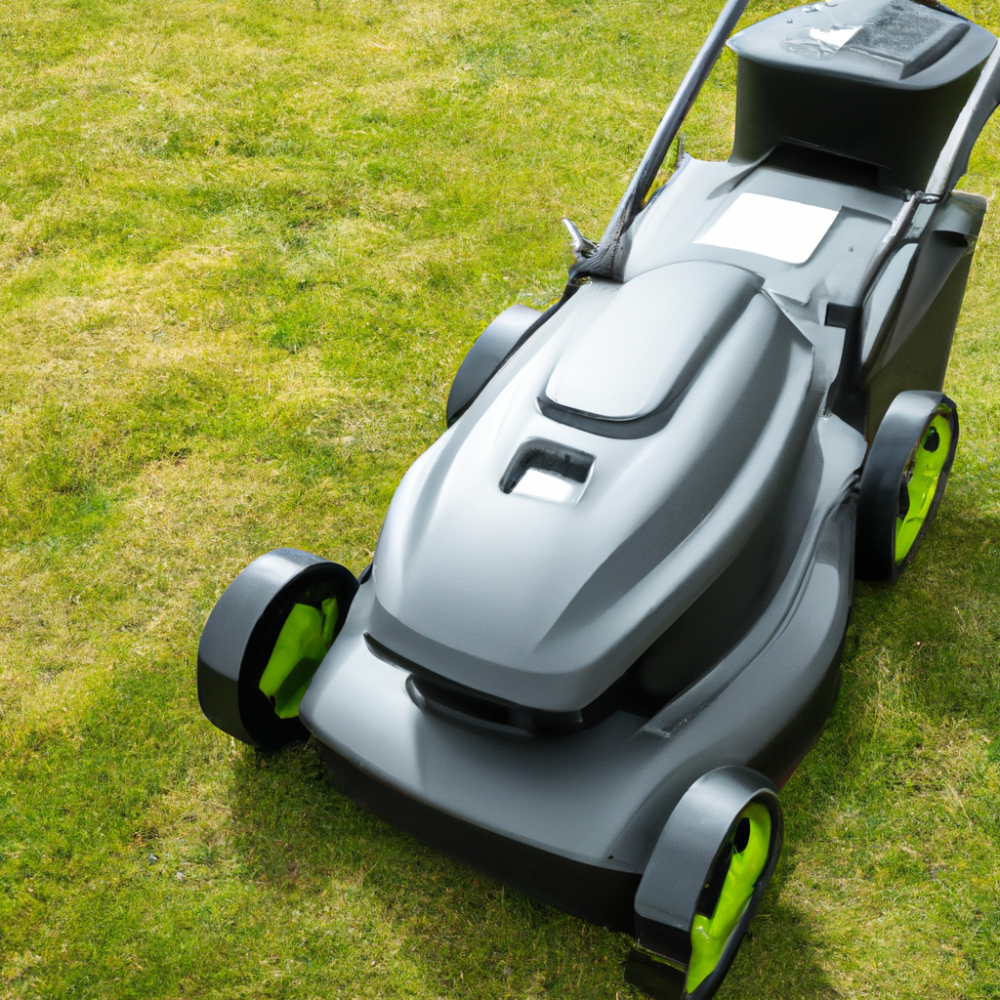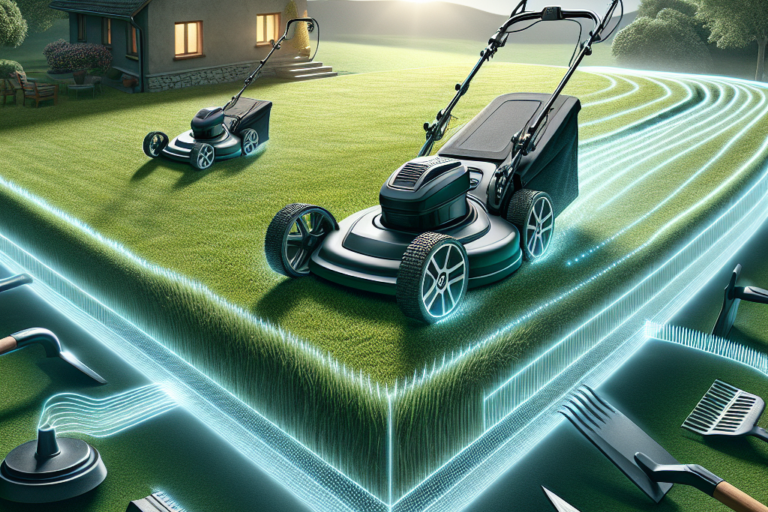Have you ever wondered if electric lawn mowers are up to the challenge of tackling slopes and hills? Well, you’re in luck! In this article, we will explore the capabilities of electric lawn mowers when it comes to navigating uneven terrain. Whether you have a hilly backyard or a sloping lawn, you’ll discover whether electric lawn mowers are the right choice for your outdoor maintenance needs. So, put your feet up and prepare to be enlightened on the topic of electric lawn mowers and their ability to conquer slopes and hills.

Factors to Consider Before Using an Electric Lawn Mower on Slopes
Before using an electric lawn mower on slopes and hills, there are several factors that you need to consider to ensure both your safety and the effectiveness of the mower. The first factor to take into account is the steepness of the slope. Electric lawn mowers are generally best suited for slopes with a gradient of 15 degrees or less. If your hill has a steeper slope, it may be better to consider alternative options.
Another important factor to consider is the condition of your lawn. If your lawn is uneven or has rough terrain, it may pose challenges for an electric mower. Unlike gas-powered mowers that tend to have larger wheels and stronger engines, electric mowers are typically lighter and may struggle to provide sufficient traction on uneven surfaces.
It’s also crucial to think about the size of your yard. If you have a large sloping lawn, using an electric lawn mower might be time-consuming as you may need to recharge the battery frequently. In such cases, it might be worth considering other alternatives like a gas-powered mower or hiring a professional landscaping service.
Lastly, it’s important to consider your own physical ability and comfort level. Operating a lawn mower on slopes can be physically demanding, even with an electric model. If you have any physical limitations or concerns, it may be safer to avoid using a push mower altogether and opt for a self-propelled model instead.
Advantages of Using an Electric Lawn Mower on Slopes and Hills
Despite the specific considerations for using electric lawn mowers on slopes and hills, there are several advantages to choosing an electric mower for these terrains. One key advantage is their environmental friendliness. Electric mowers produce zero emissions, making them a more sustainable choice compared to gas mowers. They also tend to operate more quietly, reducing noise pollution in your neighborhood.
Another advantage of electric lawn mowers is their ease of use. They typically have a push-button start, eliminating the need for manual pulling of cords. Additionally, electric mowers require less maintenance compared to gas-powered ones. With no oil changes or spark plug replacements, electric mowers are generally more hassle-free.
Electric mowers are also lighter and easier to maneuver compared to their gas counterparts. This makes them particularly suitable for slopes and hills where you may need to navigate around obstacles or change directions frequently. Their lighter weight also makes them easier to push uphill, reducing strain on your muscles.
Disadvantages of Using an Electric Lawn Mower on Slopes and Hills
While there are notable advantages to using electric lawn mowers on slopes and hills, it’s important to acknowledge their limitations as well. One major disadvantage is the limited run time of electric mowers. Most electric mowers rely on batteries, and depending on the model, the battery life may not be sufficient for larger areas or more demanding cutting conditions. It’s important to consider the run time of the mower and whether it will be able to handle the size and slope of your lawn without constantly needing recharging.
Another limitation of electric mowers is their cutting power. Gas-powered mowers typically have more cutting power, allowing them to handle taller or thicker grass more effectively. Electric mowers, on the other hand, may struggle with tougher cutting conditions. If your lawn tends to grow thick or tall grass, you may find that an electric mower is not the best choice for you.
Additionally, using an electric lawn mower on slopes and hills requires careful attention to safety precautions. The lighter weight of electric mowers can make them more prone to tipping, especially on steeper slopes. It’s important to stay vigilant, maintain a firm grip on the mower’s handles, and exercise caution when maneuvering on inclines.
Types of Electric Lawn Mowers Suitable for Slopes and Hills
When it comes to choosing an electric lawn mower for slopes and hills, there are a few different options to consider. One popular choice is the corded electric mower. These mowers are connected to a power source via a cord, providing consistent and uninterrupted power. However, the cord can limit your range of movement and may pose a tripping hazard, especially on sloping terrains.
Another option is a battery-powered electric mower. These mowers are powered by rechargeable batteries, giving you more freedom to move around without the constraints of a cord. Battery-powered mowers are typically quieter and more convenient to use, but you’ll need to ensure that the battery has sufficient run time for your specific lawn size and slope.
Some electric mowers are also equipped with self-propulsion features, which can be particularly advantageous on slopes and hills. These self-propelled mowers use a drive system to assist in moving the mower forward, reducing the effort required from you. This can be especially helpful when tackling uphill sections of your lawn.

Lawn Mower Cutting Width and Maneuverability
When choosing an electric lawn mower for slopes and hills, it’s important to consider both the cutting width and maneuverability of the mower. The cutting width refers to the width of the mower’s blades and determines how much grass can be cut in a single pass. For larger lawns, a wider cutting width can help reduce the overall mowing time. However, on slopes and hills, a wider cutting width may limit maneuverability, especially around obstacles.
Maneuverability is crucial on sloping terrains. Look for mowers that have features like swivel wheels or adjustable cutting heights to enhance maneuverability. A mower with swivel wheels can easily navigate tight corners and obstacles, while adjustable cutting heights allow you to adapt to the changing terrain of your lawn.
Power Source Options for Electric Lawn Mowers on Slopes and Hills
As mentioned earlier, there are two main power source options for electric lawn mowers: corded and battery-powered. When it comes to using electric mowers on slopes and hills, both options have their pros and cons.
Corded electric mowers provide a continuous power supply, eliminating concerns about battery life. This can be especially advantageous if you have a larger lawn or if you plan to tackle your lawn in a single mowing session. However, the cord can limit your range of movement and may pose challenges on sloping terrains. It’s important to ensure that you have a suitable and safe outdoor power outlet in close proximity to your mowing area.
On the other hand, battery-powered electric mowers offer more freedom of movement, allowing you to mow without the constraints of a cord. They tend to be quieter and more convenient to use, but you’ll need to monitor the battery life and recharge as necessary. For larger lawns or more demanding cutting conditions, it may be worth investing in a mower with a longer battery run time or having an extra battery on hand to ensure you can complete the job without interruption.
Safety Considerations When Using Electric Lawn Mowers on Slopes
Using an electric lawn mower on slopes and hills requires extra attention to safety precautions. Here are some important safety considerations to keep in mind:
- Wear appropriate footwear: Opt for sturdy, closed-toe shoes with good traction to provide stability and grip while operating the mower on slopes.
- Avoid mowing in wet or slippery conditions: Wet grass and slippery slopes increase the risk of accidents and mower slippage. It’s best to wait for dry conditions before mowing.
- Always mow across slopes, not up or down: Mowing across the slope reduces the risk of losing control or the mower tipping over. Avoid mowing directly up or down the slope to maintain stability.
- Take breaks and stay hydrated: Mowing on slopes can be physically demanding. Take regular breaks and stay hydrated to prevent fatigue and reduce the risk of accidents.
- Clear the mowing area of debris: Remove any rocks, sticks, or other debris from the lawn before mowing to prevent damage to the mower and to avoid potential hazards.
- Pay attention to the terrain: Be aware of any uneven areas, holes, or hidden obstacles that may pose a risk while maneuvering the mower on slopes. Take slow and cautious steps when navigating these areas.
By following these safety guidelines, you can ensure a safer mowing experience on slopes and hills with your electric lawn mower.
Maintenance Tips for Electric Lawn Mowers on Slopes and Hills
Proper maintenance is key to keeping your electric lawn mower in optimal condition for tackling slopes and hills. Here are some maintenance tips to consider:
- Keep the blades sharp: Sharp blades result in cleaner cuts and minimize strain on the mower’s motor. Regularly inspect and sharpen the blades as needed to ensure efficient cutting performance.
- Clean the underside of the mower deck: Grass clippings and debris can accumulate beneath the mower deck, affecting cutting performance and potentially causing rust. After each use, remove any built-up debris and clean the underside of the deck.
- Check the wheels and tires: Ensure that the wheels are properly inflated and in good condition. Replace any damaged or worn-out wheels to maintain stability and maneuverability on slopes.
- Regularly inspect and tighten all bolts and fasteners: Vibration from mowing on slopes can loosen bolts and fasteners over time. Regularly check and tighten them to prevent any parts from coming loose while mowing.
- Store the mower properly: When not in use, store the mower in a clean and dry area to prevent rust and damage. If your mower has a removable battery, it’s recommended to remove it and store it separately in a cool, dry place.
By following these maintenance tips, you can extend the lifespan of your electric lawn mower while ensuring optimal performance on slopes and hills.
Operating Techniques for Electric Lawn Mowers on Slopes and Hills
When operating an electric lawn mower on slopes and hills, it’s important to employ the proper techniques to maintain safety and achieve efficient results. Here are some operating techniques to keep in mind:
- Start at the top: If possible, start mowing at the top of the slope and work your way downhill. This minimizes the risk of the mower being pulled or pushed downhill, reducing the strain on both you and the mower.
- Take it slow: Maintain a slow and steady pace while mowing on slopes to ensure stability. Avoid rushing or sudden changes in direction, as these can increase the risk of losing control.
- Use caution when turning: When reaching the bottom of the slope or changing directions, be cautious when making turns. Take wider turns to maintain control and avoid sharp pivots that could potentially cause the mower to tip over.
- Keep a firm grip on the handles: Maintain a firm grip on the mower’s handles throughout the mowing process. This provides better control and stability, especially on sloping terrains.
- Avoid mowing when grass is too wet: Wet grass can be slippery and make it more difficult to maintain control of the mower. It’s best to wait for the grass to dry before mowing on slopes and hills.
By employing these operating techniques, you can safely and effectively mow your lawn on slopes and hills with an electric mower.
Alternatives to Electric Lawn Mowers for Slopes and Hills
While electric lawn mowers can handle slopes and hills to a certain extent, there may be situations where alternative options are more suitable. Here are a few alternatives to consider:
- Gas-powered lawn mowers: Gas-powered mowers are generally more powerful and have greater cutting capacity compared to electric mowers. If you have a large lawn with challenging terrain, a gas-powered mower might be a better choice. However, they are typically noisier, require more maintenance, and produce emissions.
- Riding lawn mowers: Riding mowers, also known as lawn tractors, are ideal for larger properties with extensive lawn areas. They offer increased cutting power and are generally more suitable for handling slopes and hills. Keep in mind that riding mowers can be quite expensive and may not be necessary for smaller lawns.
- Professional landscaping services: If you have a particularly large or challenging lawn, hiring a professional landscaping service might be the best option. These experts have the knowledge, equipment, and experience to handle even the most demanding terrains, ensuring a well-maintained lawn without the hassle and physical exertion on your part.
Ultimately, the choice of whether to use an electric lawn mower or explore alternative options will depend on your specific needs, budget, and the characteristics of your lawn. Consider the factors discussed in this article and make an informed decision that suits your requirements.






